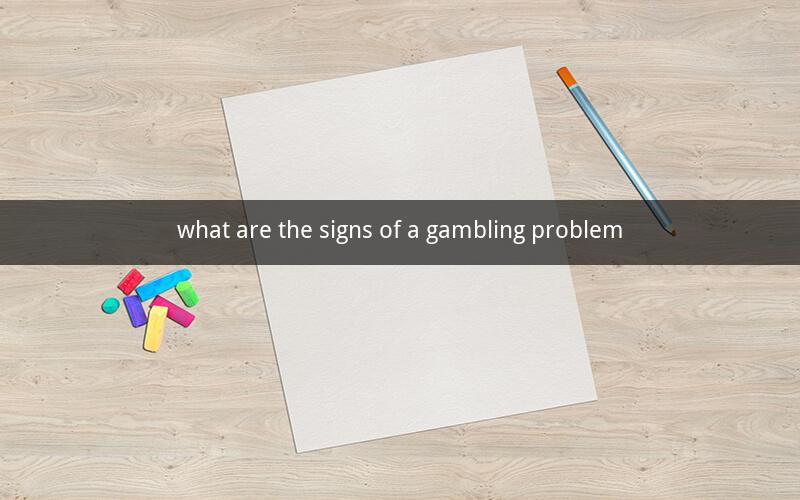
Contents
1. Introduction to Gambling
2. Defining a Gambling Problem
3. Common Signs of a Gambling Problem
- Financial Concerns
- Emotional and Psychological Effects
- Behavioral Changes
- Social and Family Impacts
4. Identifying Risk Factors
5. Seeking Help and Support
6. Conclusion
Introduction to Gambling
Gambling, an activity that dates back centuries, has evolved into a multi-billion-dollar industry. It encompasses various forms, from traditional casinos to online platforms. While many individuals engage in gambling responsibly, some may develop a problem that can have severe consequences. Recognizing the signs of a gambling problem is crucial for early intervention and support.
Defining a Gambling Problem
A gambling problem, also known as gambling disorder, is characterized by an inability to control or stop gambling despite negative consequences. It is a serious condition that can lead to financial, emotional, and psychological distress.
Common Signs of a Gambling Problem
1. Financial Concerns
- Excessive spending on gambling activities.
- Borrowing money to fund gambling habits.
- Missing bill payments or neglecting financial obligations.
- Selling personal belongings to fund gambling.
2. Emotional and Psychological Effects
- Feelings of guilt, shame, or remorse after gambling.
- Developing anxiety or depression related to gambling.
- Preoccupation with gambling thoughts, even when not engaging in the activity.
- Engaging in risky behavior to cope with negative emotions.
3. Behavioral Changes
- Skipping work or school to engage in gambling.
- Isolating oneself from friends and family.
- Increasing the amount of money or time spent on gambling.
- Lying about gambling activities to hide the problem.
4. Social and Family Impacts
- Strained relationships with loved ones.
- Divorce or separation due to gambling-related issues.
- Loss of employment or career advancement opportunities.
- Financial burden on family members.
Identifying Risk Factors
Several factors can increase the likelihood of developing a gambling problem. These include:
- Genetic predisposition: A family history of gambling problems or substance abuse can increase the risk.
- Mental health issues: Individuals with anxiety, depression, or other mental health disorders may turn to gambling as a coping mechanism.
- Environmental factors: Exposure to gambling through media, advertising, or social circles can contribute to the development of a problem.
- Personality traits: Impulsivity, thrill-seeking, and a lack of self-control can make individuals more susceptible to gambling problems.
Seeking Help and Support
If you suspect that you or someone you know has a gambling problem, seeking help is crucial. Here are some steps to consider:
- Acknowledge the problem: Admitting that there is a gambling problem is the first step towards recovery.
- Seek professional help: A therapist or counselor specializing in gambling disorders can provide guidance and support.
- Join a support group: Groups such as Gamblers Anonymous offer peer support and resources for individuals struggling with gambling problems.
- Implement self-help strategies: Develop healthy coping mechanisms, such as exercise, hobbies, or mindfulness practices.
- Seek financial advice: A financial advisor can help you manage your finances and address any financial consequences of gambling.
Conclusion
Recognizing the signs of a gambling problem is essential for early intervention and support. By understanding the common signs, risk factors, and available resources, individuals can take steps to overcome their gambling problems and regain control of their lives.
Questions and Answers
1. Q: What is the difference between gambling and a gambling problem?
- A: Gambling is a recreational activity, while a gambling problem is characterized by an inability to control or stop gambling despite negative consequences.
2. Q: Can a person with a gambling problem recover?
- A: Yes, with proper treatment and support, individuals with a gambling problem can recover and lead a fulfilling life.
3. Q: How can I tell if someone is hiding a gambling problem?
- A: Look for signs of financial strain, changes in behavior, and social withdrawal.
4. Q: Are there any medications that can help treat a gambling problem?
- A: Medications may be used in conjunction with therapy to treat underlying mental health issues contributing to gambling problems.
5. Q: Can a gambling problem affect a person's career?
- A: Yes, a gambling problem can lead to financial and social consequences that may impact career opportunities.
6. Q: How can I support someone with a gambling problem?
- A: Encourage them to seek professional help, offer empathy and understanding, and be a source of support throughout their recovery journey.
7. Q: Are there any support groups available for individuals with gambling problems?
- A: Yes, organizations such as Gamblers Anonymous offer peer support and resources for individuals struggling with gambling problems.
8. Q: Can a gambling problem be caused by a person's personality?
- A: Yes, certain personality traits, such as impulsivity and thrill-seeking, can increase the likelihood of developing a gambling problem.
9. Q: How can I help my loved one overcome their gambling problem?
- A: Be patient, supportive, and encourage them to seek professional help. Educate yourself about gambling disorders to better understand their struggles.
10. Q: Can a gambling problem lead to other mental health issues?
- A: Yes, a gambling problem can contribute to the development of mental health issues such as anxiety, depression, and substance abuse.